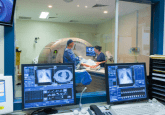Biomarker panel for the early detection of esophageal cancer in development

Details of the development and validation of a four-protein serum biomarker panel that could be used for the early detection of esophageal cancer were published online last week in Cancer.
The panel, which consists of biglycan, myeloperoxidase, annexin-A6 and protein S100-A9, is termed B-AMP. The researchers, led by Blair Jobe of Allegheny Health Network (PA, USA), found that this noninvasive low-cost blood test was able to identify esophageal cancer with an accuracy of 87%.
Incidence of this often deadly cancer has increased 600% since the 1970s. Survival is likely to be longer if the disease is diagnosed at an early stage, yet it often goes undetected as symptoms are not obvious in the early stages. The identification of valid blood-based biomarkers could improve early detection of the disease, but previous efforts have met difficulty in identifying a single conserved and universal tracking marker.
“Esophageal cancer patients often have few options available to fight this disease, and 5-year survival rates are extremely low at about 15%,” commented Jobe (Allegheny Health Network). “We’ve made progress in treating and monitoring patients with conditions that can progress to esophageal cancer, such as gastroesophageal reflux disease (GERD), Barrett’s esophagus and high-grade dysplasia. Yet only a small minority of these patients develop life-threatening esophageal cancer. Better detection techniques are needed to identify the patients who will likely progress from these precursor lesions to cancer.”
Utilizing tissue data from the esophageal cancer progression sequence (samples obtained from the University of Pittsburgh [PA, USA], representing patients with Barrett’s esophagus, high-grade dysplasia and esophageal cancer), proteomic analysis was employed to identify targets with cancer relevance for potential serum detection.
Blood samples from patients with non-Barrett’s esophagus GERD and esophageal cancer were then tested for the candidate biomarkers. Five of the candidate tissue proteins were defined as significantly elevated in the blood samples from patients with esophageal cancer, with four of these five determined to have predictive value.
The test is already being used in a clinical trial setting to monitor the course of esophageal cancer, providing information regarding response to therapy and recurrence, allowing for pursuit of different or more aggressive therapies if necessary.
If use of the biomarker panel is further validated, in future it could be used clinically to screen high-risk patients, monitor progression from precursor conditions to malignancy, track responses to cancer therapy and detecting recurrence prior to imaging.


